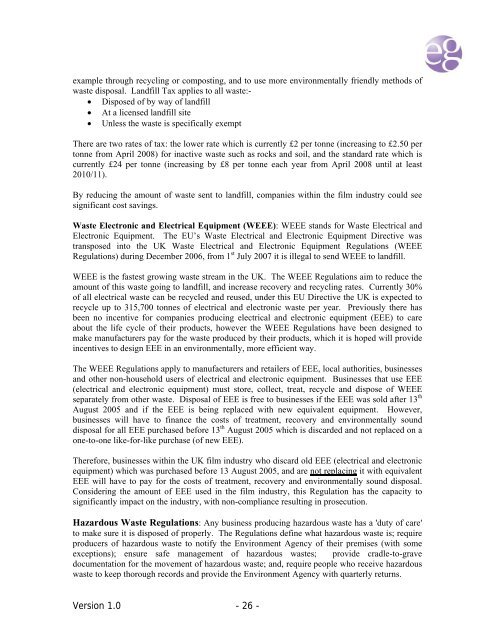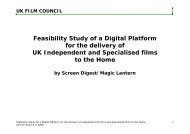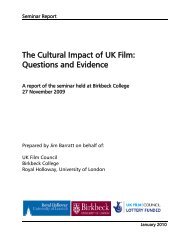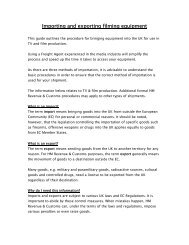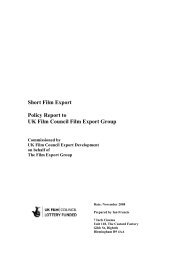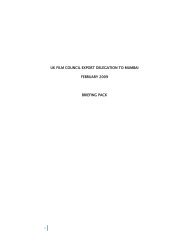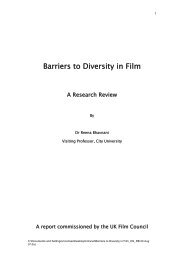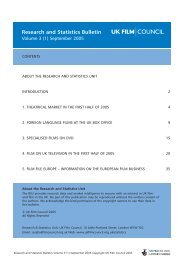Developing an environmental strategy for UK film - BFI
Developing an environmental strategy for UK film - BFI
Developing an environmental strategy for UK film - BFI
Create successful ePaper yourself
Turn your PDF publications into a flip-book with our unique Google optimized e-Paper software.
example through recycling or composting, <strong>an</strong>d to use more <strong>environmental</strong>ly friendly methods of<br />
waste disposal. L<strong>an</strong>dfill Tax applies to all waste:-<br />
• Disposed of by way of l<strong>an</strong>dfill<br />
• At a licensed l<strong>an</strong>dfill site<br />
• Unless the waste is specifically exempt<br />
There are two rates of tax: the lower rate which is currently £2 per tonne (increasing to £2.50 per<br />
tonne from April 2008) <strong>for</strong> inactive waste such as rocks <strong>an</strong>d soil, <strong>an</strong>d the st<strong>an</strong>dard rate which is<br />
currently £24 per tonne (increasing by £8 per tonne each year from April 2008 until at least<br />
2010/11).<br />
By reducing the amount of waste sent to l<strong>an</strong>dfill, comp<strong>an</strong>ies within the <strong>film</strong> industry could see<br />
signific<strong>an</strong>t cost savings.<br />
Waste Electronic <strong>an</strong>d Electrical Equipment (WEEE): WEEE st<strong>an</strong>ds <strong>for</strong> Waste Electrical <strong>an</strong>d<br />
Electronic Equipment. The EU’s Waste Electrical <strong>an</strong>d Electronic Equipment Directive was<br />
tr<strong>an</strong>sposed into the <strong>UK</strong> Waste Electrical <strong>an</strong>d Electronic Equipment Regulations (WEEE<br />
Regulations) during December 2006, from 1 st July 2007 it is illegal to send WEEE to l<strong>an</strong>dfill.<br />
WEEE is the fastest growing waste stream in the <strong>UK</strong>. The WEEE Regulations aim to reduce the<br />
amount of this waste going to l<strong>an</strong>dfill, <strong>an</strong>d increase recovery <strong>an</strong>d recycling rates. Currently 30%<br />
of all electrical waste c<strong>an</strong> be recycled <strong>an</strong>d reused, under this EU Directive the <strong>UK</strong> is expected to<br />
recycle up to 315,700 tonnes of electrical <strong>an</strong>d electronic waste per year. Previously there has<br />
been no incentive <strong>for</strong> comp<strong>an</strong>ies producing electrical <strong>an</strong>d electronic equipment (EEE) to care<br />
about the life cycle of their products, however the WEEE Regulations have been designed to<br />
make m<strong>an</strong>ufacturers pay <strong>for</strong> the waste produced by their products, which it is hoped will provide<br />
incentives to design EEE in <strong>an</strong> <strong>environmental</strong>ly, more efficient way.<br />
The WEEE Regulations apply to m<strong>an</strong>ufacturers <strong>an</strong>d retailers of EEE, local authorities, businesses<br />
<strong>an</strong>d other non-household users of electrical <strong>an</strong>d electronic equipment. Businesses that use EEE<br />
(electrical <strong>an</strong>d electronic equipment) must store, collect, treat, recycle <strong>an</strong>d dispose of WEEE<br />
separately from other waste. Disposal of EEE is free to businesses if the EEE was sold after 13 th<br />
August 2005 <strong>an</strong>d if the EEE is being replaced with new equivalent equipment. However,<br />
businesses will have to fin<strong>an</strong>ce the costs of treatment, recovery <strong>an</strong>d <strong>environmental</strong>ly sound<br />
disposal <strong>for</strong> all EEE purchased be<strong>for</strong>e 13 th August 2005 which is discarded <strong>an</strong>d not replaced on a<br />
one-to-one like-<strong>for</strong>-like purchase (of new EEE).<br />
There<strong>for</strong>e, businesses within the <strong>UK</strong> <strong>film</strong> industry who discard old EEE (electrical <strong>an</strong>d electronic<br />
equipment) which was purchased be<strong>for</strong>e 13 August 2005, <strong>an</strong>d are not replacing it with equivalent<br />
EEE will have to pay <strong>for</strong> the costs of treatment, recovery <strong>an</strong>d <strong>environmental</strong>ly sound disposal.<br />
Considering the amount of EEE used in the <strong>film</strong> industry, this Regulation has the capacity to<br />
signific<strong>an</strong>tly impact on the industry, with non-compli<strong>an</strong>ce resulting in prosecution.<br />
Hazardous Waste Regulations: Any business producing hazardous waste has a 'duty of care'<br />
to make sure it is disposed of properly. The Regulations define what hazardous waste is; require<br />
producers of hazardous waste to notify the Environment Agency of their premises (with some<br />
exceptions); ensure safe m<strong>an</strong>agement of hazardous wastes; provide cradle-to-grave<br />
documentation <strong>for</strong> the movement of hazardous waste; <strong>an</strong>d, require people who receive hazardous<br />
waste to keep thorough records <strong>an</strong>d provide the Environment Agency with quarterly returns.<br />
Version 1.0 - 26 -


